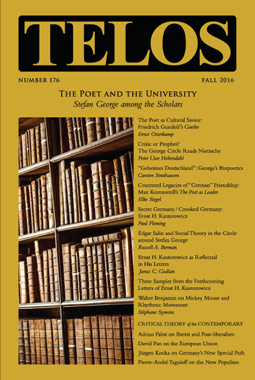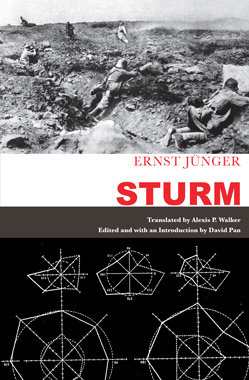 One often speaks of the importance of poetry for thought, even of poetry as a mode of thinking, and perhaps nowhere more than in Germany, the country of Dichter and Denker, of poets and thinkers. The German intellectual tradition is defined by a long, intimately interwoven relation between poetry and thought going back to the solidification of the Modern Age in the eighteenth century: Klopstock’s “Republic of Letters”; Goethe and Schiller’s Classicism, especially Schiller’s “aesthetic state”; Hölderlin’s “founding poets” and the centrality of poets in “the time of need”; Jena Romanticism’s inextricable relation between “Symphilosophie” and “Sympoesie”; Hegel’s definition of beauty as “the sensible shining forth of the idea”; and onward to this day.
One often speaks of the importance of poetry for thought, even of poetry as a mode of thinking, and perhaps nowhere more than in Germany, the country of Dichter and Denker, of poets and thinkers. The German intellectual tradition is defined by a long, intimately interwoven relation between poetry and thought going back to the solidification of the Modern Age in the eighteenth century: Klopstock’s “Republic of Letters”; Goethe and Schiller’s Classicism, especially Schiller’s “aesthetic state”; Hölderlin’s “founding poets” and the centrality of poets in “the time of need”; Jena Romanticism’s inextricable relation between “Symphilosophie” and “Sympoesie”; Hegel’s definition of beauty as “the sensible shining forth of the idea”; and onward to this day.
|
“The vastness and deadly desolation of the field, the long-distance operation of steel machines, and the relay of every movement in the night drew an unyielding Titan’s mask over the proceedings. You moved toward death without seeing it; you were hit without knowing where the shot came from. Long since had the precision shooting of the trained marksman, the direct fire of guns, and with it the charm of the duel, given way to the concentrated fire of mechanized weapons. The outcome was a game of numbers: Whoever could cover a certain number of square meters with the greater mass of artillery fire, won.” “When a man fell, the others stood together over his corpse; their gazes met, dark and deep. But when death stood over the trenches like a storm cloud, then it was every man for himself: he stood alone in the darkness, howling and crashing surrounding him, blinded by sudden flashes, with nothing in his breast but endless desolation.” —Ernst Jünger, Sturm, describing the soldiers awaiting attack during the Battle of the Somme, whose centenary is this year. Most people think that the military is all about killing other people. I, on the contrary, follow van Creveld. He states that serving in the military means more to be prepared and willing to risk one’s life then to endanger other lives. You could argue that military technology provides tools that have kinetic effects over huge distances without any risk for one’s personnel. Drones, for example, are such weapons. However, can you win a war with only drones? We have relearned the lesson that it takes “boots on the ground” to win “the better peace,” as Clausewitz carefully worded it. It takes soldiers on the ground to control an area, to protect the population, to de-escalate a situation, and to win hearts and minds.
Politicians who warn us against the New Right have been speaking about “Weimar conditions.” Isn’t the comparison with the pre-Hitler era exaggerated? Not as far as the surprise attack dynamic is concerned. One is in fact reminded of the speed with which the National Socialist party gained political ground in the Weimar Republic. First it had 18%, then suddenly 30%, and soon governing without it became practically impossible. Let’s be honest: Today no one knows where the AfD will reach its limit. In Austria, the candidate of the right-wing populist FPÖ got half the votes. Not that long ago, who would have thought this possible? |
||||
|
Telos Press Publishing · PO Box 811 · Candor, NY 13743 · Phone: 212-228-6479 Privacy Policy · Data Protection Copyright © 2025 Telos Press Publishing · All Rights Reserved |
||||



